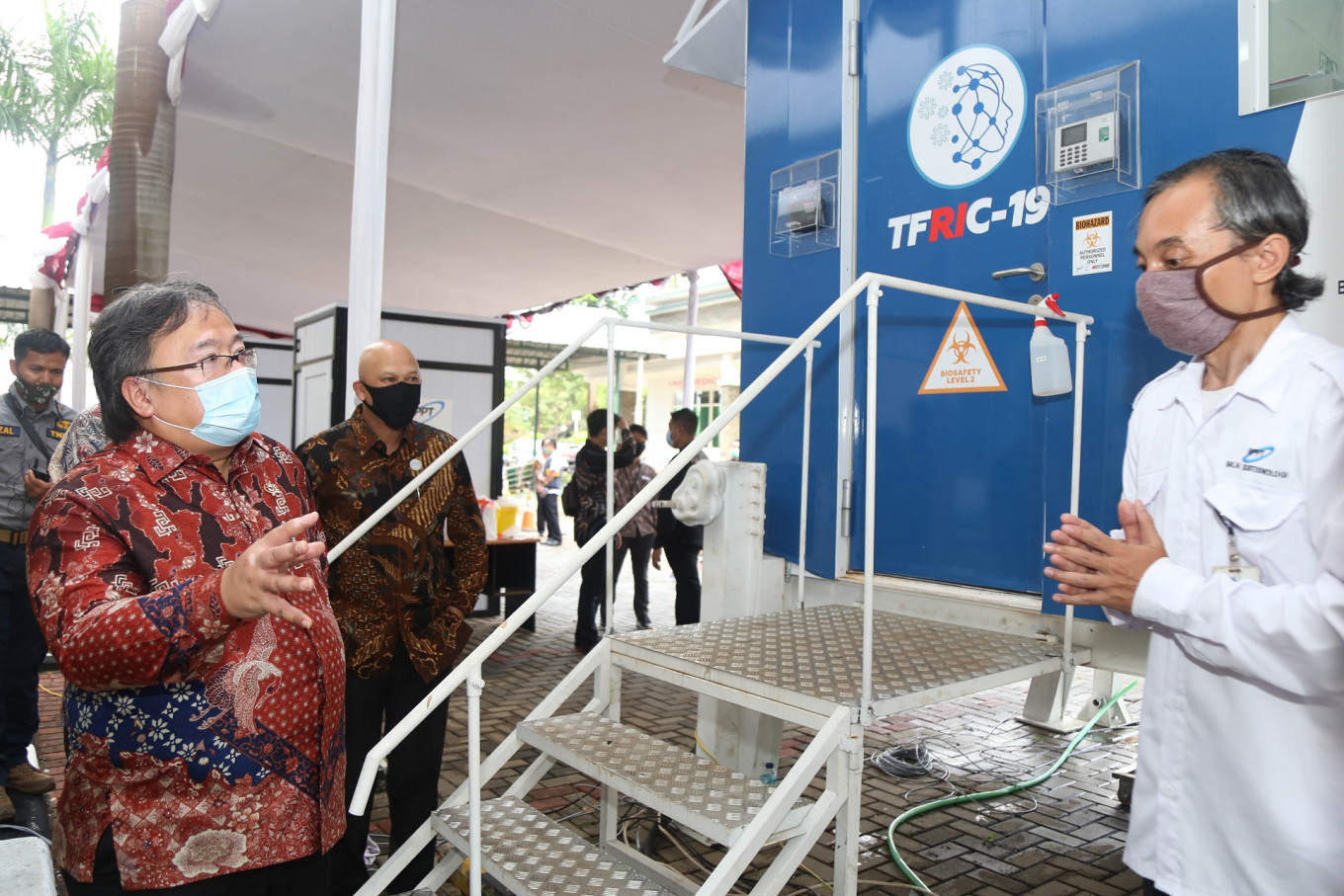Popular Reads
Top Results
Can't find what you're looking for?
View all search resultsPopular Reads
Top Results
Can't find what you're looking for?
View all search resultsIndonesian government aims to produce 2 million PCR test kits a month
Change text size
Gift Premium Articles
to Anyone
 Research and Technology Minister Bambang Brodjonegoro (left) and Agency for the Assessment and Application of Technology (BPPT) head Hammam Riza (second left) check on a mobile biosafety level-2 laboratory in Jakarta on June 16. The laboratory was built by the BPPT and the national COVID-19 task force on research and technological innovation (TFRIC-19) to ramp up the country’s capacity in detecting COVID-19. (Courtesy of/BPPT)
Research and Technology Minister Bambang Brodjonegoro (left) and Agency for the Assessment and Application of Technology (BPPT) head Hammam Riza (second left) check on a mobile biosafety level-2 laboratory in Jakarta on June 16. The laboratory was built by the BPPT and the national COVID-19 task force on research and technological innovation (TFRIC-19) to ramp up the country’s capacity in detecting COVID-19. (Courtesy of/BPPT)
R
esearch and Technology Minister Bambang Brodjonegoro, who also heads the National Research and Innovation Agency (BRIN), has stated a target for a state-owned company to produce 2 million polymerase chain reaction (PCR) test kits for COVID-19 per month.
"Production is now estimated at 1.5 million units per month and will increase to 2 million per month," Bambang said in a virtual press conference on Tuesday as quoted by tribunnews.com.
The government is working with state-owned pharmaceutical company PT Biofarma to produce the PCR test kit.
Apart from the PCR test kits, BRIN’s COVID-19 research consortium is also making antibody-based rapid test kits, currently some 350,000 per month.
"Hopefully the production of [the antibody-based rapid test kits] can reach 1 million units per month by the end of the year," said Bambang.
The government has partnered with two private companies to produce the antibody-based rapid test kits and hopes two other domestic private companies will join the effort.
The PCR test kit production is part of nine innovative steps taken by the consortium to support Indonesia’s advanced pandemic countermeasures. The consortium involves state institutions as well as the private sector and universities adept at health-related studies.
Aside from the test kits, the research consortium has developed ventilators to be used for patient treatment. One domestically produced ventilator is the Vent-I, developed by West Java-based Bandung Institute of Technology (ITB), Padjajaran University (Unpad) and the Salman Mosque Foundation.
The research consortium will also produce a medical assistance robot named RAISA to help provide medicine to hospitalized patients. It will also develop several medicines to treat COVID-19 patients, including convalescent plasma taken from recovered patients as well as herbal immunomodulator and antiviral medicines, respectively, to improve the body’s immune system and relieve symptoms in patients.
Several West Java-based universities are putting their innovation resources to work to tackle the pandemic, with Unpad and the ITB having worked together to develop Surface Plasmon Resonance (SPR) sensors.
Unpad, in collaboration with private companies PT Tekad Mandiri Citra and PT Pakar Biomedika Indonesia, has also been developing a rapid antigen detection test, CePAD.
CePAD and the sensors could be an alternative to rapid antibody tests and PCR test machines, respectively, said Muhammad Yusuf from Unpad’s Biotechnology, Molecular and Bioinformatics Research Center, who was involved in both projects. The prototypes are currently undergoing a series of tests by the Health Ministry for authorization. (iwa)









